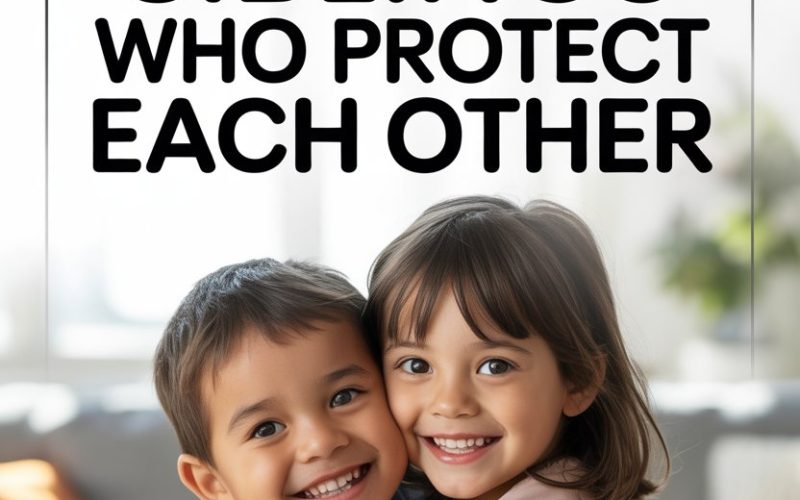Ever wished you could bottle that rare, magical moment when your older kid instinctively saves the toddler from a headfirst leap off the sofa—then sell it to every parent you know? You’re not alone.
While most siblings spend a solid chunk of their early years bickering about who touched whose chips, there’s a quiet hope in every parent’s heart: that their children will have each other’s backs when it matters.
Yes, even if those backs are occasionally used as springboards.
Here’s how to encourage that elusive, wonderful thing—siblings who protect each other, through thick, thin, and whatever sticky situation is currently coating your living room floor.
Start with the Little Stuff
Grand gestures get all the glory, but it’s the tiny, daily acts of kindness between siblings that lay a foundation of trust.
Catch them sharing a biscuit? Nod approvingly. Witness a gentle, “It’s okay, I’ll help you,” when someone can’t zip a coat? That’s gold.
Praise those moments out loud—“I love how you looked out for your brother just then!”—and you’ll find they crop up more often than you’d expect.
Experts agree that positive reinforcement is powerful.
According to Harvard’s Center on the Developing Child, consistently noticing and responding to children’s prosocial behaviour helps those neural pathways get nice and strong.
Model the Kind of Loyalty You Want
Monkey see, monkey do—no cliché rings truer than this when it comes to sibling relationships.
If children see you stick up for your partner, speak kindly about family members, and defend friends when they’re not around, they get a masterclass in loyalty and protection—without a lecture in sight.
That means biting your tongue when you’re tempted to mutter about your own siblings (especially if little ears are listening).
Instead, share stories that highlight looking out for one another: “When I was little, Auntie Sal always made sure I got home safe. That’s what families do.”
Normalize Differences but Stress Teamwork
Every child is different (sometimes dramatically so—one will eat anything that doesn’t move, the other lives on beige food and drama). That’s not a flaw; it’s an asset.
Teach your children that being different doesn’t mean being divided.
You might say, “You both like different games, but it’s cool when you try each other’s favourites, right?” Celebrate their unique strengths, but remind them that together, they make a pretty unbeatable team.
According to child development research from the University of Cambridge, collaborative play not only boosts empathy but also strengthens sibling bonds.
So, yes, the epic Lego city is about more than just bricks everywhere.
Set Boundaries, Then Let Them Sort Some Squabbles
Parental refereeing is an Olympic sport—one no one trains for, yet everyone gets drafted. But swooping in at the first sign of squabbling can backfire.
Children need space to learn conflict resolution and, more importantly, how to stand up for each other without you as the constant middleman.
That said, don’t let things escalate into WWE territory. Lay ground rules: “No hitting, no screaming, and absolutely no using the cat as a weapon.”
For minor spats, encourage them to talk it out. You might be surprised at the creative peacemaking strategies children invent when given the chance.
Give Shared Responsibilities
Nothing unites siblings faster than a common mission—especially if it’s just a tiny bit mischievous.
A two-person race to clear the breakfast dishes (“You do spoons, I’ll do plates!”) or teaming up to tidy their room before a movie can foster camaraderie.
Even better, assign them as each other’s ‘buddy’ when out and about. “Keep an eye on your sister at the playground—she’s counting on you.”
The research backs this up: Stanford University studies show that siblings who share household tasks are more likely to internalize responsibility for each other’s wellbeing.
Talk About Real-World Scenarios
Half the battle of raising protective siblings is helping them spot when backup is needed.
Turn bedtime stories into teachable moments: “What would you do if you saw someone being unkind to your brother?” “How could you help if your sister lost her way in the shop?”
Role-playing isn’t just for drama clubs or awkward work retreats. It gives children practical scripts and confidence to step up for each other, at home or in the wilds of the school playground.
Create Traditions that Celebrate Their Connection
Whether it’s Friday-night board games, Saturday-morning pancakes, or inventing a secret handshake only they know, family rituals give siblings a shared sense of belonging.
Ask them to come up with a silly nickname for each other or a special “high five” that’s just theirs. These small, quirky rituals might not seem like much, but they’re micro-memories that remind siblings, “We’re in this together.”
Dr. Laura Markham, a clinical psychologist, points out that rituals build a sense of safety and connection—crucial ingredients for protective sibling bonds. You can read her take on why rituals matter.
Don’t Force Friendship, but Ban Bullying
Every parent secretly dreams that their children will be lifelong best mates. The harsh reality? They might not be. And that’s okay.
Your job isn’t to manufacture friendship; your job is to create a home where kindness and respect are non-negotiable.
Nip mean teasing and sibling rivalry in the bud, but don’t pressure them to like all the same things or always want to play together. Sometimes, a bit of space is the miracle ingredient.
Just make sure the rule is clear: You can be annoyed at each other, but cruelty isn’t tolerated.
If you need a bit of backup, this research summary from the American Psychological Association spells out how unchecked sibling bullying can have long-term effects—so set the tone early.
Encourage Empathy at Every Turn
Empathy doesn’t arrive with the tooth fairy; it’s learned bit by bit. When your child is sad, name the feeling and show compassion.
When they cause a sibling’s tears—even by accident—guide them to notice and care: “Look at her face. She’s upset because you grabbed her toy. What can you do to help her feel better?”
Small acts of empathy snowball.
Suddenly, you’ll catch your older child pausing before barging into a shared bedroom, or your younger one offering a tissue during an emotional meltdown. Miracles do happen.
According to studies highlighted by Greater Good Science Center, parents can nurture empathy through modeling, active listening, and encouraging perspective-taking.
Let Them Have Each Other’s Backs Outside the Home
Children need chances to practice being each other’s defender beyond your four walls. At the park, encourage “look out for your brother.” When they start school, teach them to notice if a sibling is struggling or being left out.
If tattling becomes an Olympic sport in your house, reframe it: “If you’re telling me because your sister is hurt or scared, that’s looking after her.
If you’re telling me she’s breathing too loudly, that’s not urgent.”
Big difference.
Give Them Time Apart
Amazing things happen when siblings get the gift of missing each other. If they’re constantly together, the probability of squabbles skyrockets.
A little one-on-one parent time, separate playdates, or even just different activities in different rooms can lower the temperature.
When they reunite, watch for those little moments of checking in, sharing a snack, or—gasp—playing nicely for a full ten minutes.
Absence makes the heart grow fonder (or at least, slightly less annoyed).
Celebrate Acts of Protection
When one sibling stands up for the other, rescuing a toy from a too-curious toddler or sticking up for their brother at the park, roll out the red carpet.
Tell the story at dinner (“Did you see what Lucy did for Max today?”), write a note for their bedroom wall, or just say, “That was really brave.” Those moments become part of family lore, reinforcing the message: This is what we do for each other.
Teach Them to Ask for Help
No child should be expected to tackle every situation alone—not even with a sibling sidekick. Make it clear that asking for grown-up help is not “tattling” or “snitching” if someone feels scared, threatened, or overwhelmed.
“Looking after each other” should never mean hiding serious worries from adults. Siblings make a great team, but you’re still the coach.
Watch Out for “Hero Complex” Pitfalls
Some children can be so eager to protect a sibling that they take on too much responsibility or become anxious about their safety.
If you spot a child always stepping in, never leaving their sibling’s side, or worrying excessively, check in with them.
Remind both children that looking after each other also means taking care of their own needs. Balance is key here—you want protectors, not pint-sized martyrs.
When the Going Gets Tough
Life isn’t always a picnic (unless you count the ones where ants steal the sandwiches and someone spills juice on your lap). Illness, family changes, or school struggles can test even the closest sibling bonds.
During tricky times, remind your children that you’re all on the same team. “We’re having a rough patch, but we can help each other through it.”
Sometimes just sitting together with a box of tissues and a plate of biscuits does more than a thousand pep talks.
Siblings for Life
There’s no secret formula for raising siblings who protect each other—only a mix of patience, encouragement, and a willingness to celebrate the moments when they get it right.
Some days you’ll feel like a referee, others like a cheerleader. With luck, you’ll witness one of the purest joys of parenthood: children who, even after the great “who-ate-the-last-biscuit” debacle of 2023, still come together when it counts.
The world out there can be a wild place.
Sending siblings out in it, knowing they have each other’s backs? That’s the stuff that keeps parents sane—well, saner than we’d be otherwise.




